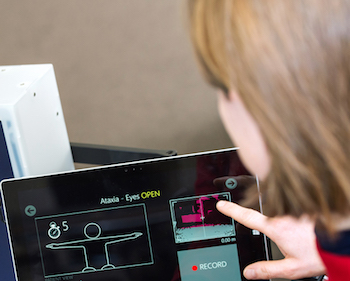 Microsoft has announced a partnership Novartis that began a few years ago to create a system, called Assess MS, that better evaluates how patients perform on multiple sclerosis (MS) tests.
Microsoft has announced a partnership Novartis that began a few years ago to create a system, called Assess MS, that better evaluates how patients perform on multiple sclerosis (MS) tests.
The current MS tests require patients to perform movements, like touching their nose or sitting with their arms outstretched. Providers watch the patients and rate their movements on a scale, but ratings that providers give are somewhat subjective, according to the companies.
“The clinicians that we worked with really care about their patients,” Abigail Sellen, a principal researcher in the Human Experience and Design group at Microsoft, said in a statement. “They really want what’s best for them, and even the best neurologist will admit that when they use these rating scales, it’s pretty coarse-grained. They know that there’s a lot of variability, even in their own judgments, over time.”
As a result, Microsoft and Novartis are working on developing an offering using Microsoft’s Kinect technology to get more consistent results from MS tests so that researchers can better identify how far a patient with MS has progressed and which treatments would be most appropriate.
Sellen explained that Assess MS is not meant to replace the physician, but instead provide them with accurate data that they can incorporate into their diagnosis.
Microsoft is working with Novartis to build algorithms that will pick up on subtle movements a patient makes, like when the patient’s torso sways, as well as to alter the Kinect system to fit the clinical setting.
For the algorithms, the companies worked together to create new systems for labeling data consistently. Researchers also altered the system so that that would fit in an exam room.
“We needed to ask, right from the beginning, ‘How do we make it work in the clinics?’” Morrison said.
The Assess MS camera has wheels so that the device can move around something, like a purse, if it is in the way. It also has a screen that provides patients with an animation that demonstrates movements.
Microsoft and Novartis have built a proof of concept of the system but still need to test it in practice to see how it works with more patients. Eventually Novartis will use the offering to speed up clinical trials on MS. While the companies are focused on MS for now, in the future, researchers plan to offer the system for similar diseases.
In May 2014, Novartis partnered with health tracking and analytics platform Tictrac to launch an awareness campaign, called The 7-Day Challenge to Live Like You, for multiple sclerosis (MS). The campaign prompted participants to track different aspects of their lifestyle including weight, activity, mood, and workload. This data was used to create visualizations of their day-to-day life. Participants were able to sync various platforms and devices with Tictrac's platform including Fitbit, Jawbone UP, Withings, Gmail, Facebook, and Runkeeper.
Last year two other pharma companies made digital health-related deals to study MS.
In January 2015, Biogen Idec partnered with a subsidiary of Alphabet, previously known as Google, to study outside factors that might contribute to the progression of multiple sclerosis (MS). Google and Biogen planned use sensors, software, and data analysis tools to collect and analyze data from people who have MS. The companies aim to explore why MS progresses differently in each patient.
A few months later, Boston-based patient network PatientsLikeMe announced the results of a multiple sclerosis wearable study conducted in collaboration with Biogen. The Biogen study was a non-controlled feasibility study to assess the potential usefulness of wearables in increasing the activity of people with multiple sclerosis, and in tracking their activity outside of a doctor's office setting.















